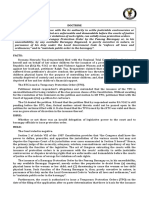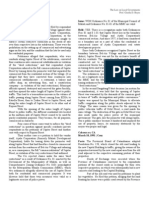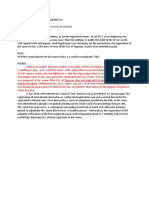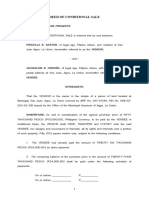Francisca Taar Et. Al. V Claudio Lawan Et. Al.
Francisca Taar Et. Al. V Claudio Lawan Et. Al.
Uploaded by
rafael.louise.roca2244Copyright:
Available Formats
Francisca Taar Et. Al. V Claudio Lawan Et. Al.
Francisca Taar Et. Al. V Claudio Lawan Et. Al.
Uploaded by
rafael.louise.roca2244Original Title
Copyright
Available Formats
Share this document
Did you find this document useful?
Is this content inappropriate?
Copyright:
Available Formats
Francisca Taar Et. Al. V Claudio Lawan Et. Al.
Francisca Taar Et. Al. V Claudio Lawan Et. Al.
Uploaded by
rafael.louise.roca2244Copyright:
Available Formats
REMEDIAL LAW: CIVIL PROCEDURE
Francisca Taar et. al. v Claudio Lawan et. al.
G.R. No. 190922, October 11, 2017, THIRD DIVISION
(LEONEN, J.)
DOCTRINES:
a. A petition for certiorari under Rule 65 of the Rules of Court is an extraordinary
remedy. Its scope of review is narrow, limited only to errors of jurisdiction.
b. The rule on res judicata states that a final judgment or decree rendered on the
merits by a court of competent jurisdiction is conclusive of the rights of the
parties or their privies, in all other subsequent actions or suits and on all points
and matters determined in the first suit.
FACTS:
Narcisa Taar (Narcisa), Alipio Duenas (Alipio), Fortunata Duenas (Fortunata),
and Pantaleon Taar (Pantaleon) inherited two (2) vast tracts of land situated in Tarlac.
One (1) parcel of land was adjudicated exclusively in favor of Pantaleon while the other
parcel of land was given to Pantaleon, Narcisa, Alipio, and Fortunata. Narcisa sold her
share to Spouses Primitive T. Adaoag and Pilar Tandoc (the Adaoag Spouses) and to
Spouses Ignacio Gragasin and Genoveva Adaoag (the Gragasin Spouses).
Later, Pantaleon, Alipio, Fortunata, the Adaoag Spouses, and the Gragasin
Spouses executed an agreement to partition the second parcel of land. This agreement
was approved by the Court of First Instance of Tarlac.
Pantaleon, Alipio, and Fortunata were the predecessors-in-interest of
Francisca, Joaquina, Lucia, and Oscar L. Galo.
The private respondents, Claudio Lawan (Claudio), Marcelino M. Galo
(Marcelino), Artemio Abarquez (Artemio), Augusto B. Lawan (Augusto), and Adolfo L.
Galo filed a verified protest alleging that their predecessors-in-interest had been in
actual, physical, exclusive, and notorious possession and occupation of the land since
1948.
Private respondents filed their free patent applications before the Tarlac
Community Environment and Natural Resources Office. Their applications covered the
Property, which was also claimed by petitioners. Private respondents' applications
were approved. The corresponding free patents and certificates of title were then
issued in their favor.
Petitioners filed before the Secretary of the Department o:f Environment and
Natural Resources a Verified Petition to annul Director Sibbaluca's Order on the
ground of extrinsic fraud and to cancel private respondents' free patents and
certificates of title.
Secretary of Department of Environment and Natural Resources Angelo T.
Reyes (Secretary Reyes) adopted the findings of the investigating team and ordered the
cancellation of the free patents and the certificates of title issued in favor of private
respondents.
REMEDIAL LAW: CIVIL PROCEDURE
The Office of the President, through then Executive Secretary Eduardo R.
Ermita (Executive Secretary Ermita), reversed Secretary Reyes' Decision and reinstated
Director Sibbaluca's Order. The Office of the President held that Secretary Reyes erred
in reversing Director Sibbaluca's Order as it had already attained finality.
The Court of Appeals dismissed the petition for certiorari outright for being an
inappropriate remedy. The Court of Appeals noted that an appeal could have been
taken from the Decision and the Resolution of the Office .of the President. Instead of
filing an original action for certiorari, they should have filed a petition for review under
Rule 43 of the Rules of Court.
ISSUES:
1. Did the Court of Appeals err in dismissing the petition for certiorari filed by
Francisca Taar, Joaquina Taar, Lucia Taar, and the Heirs of Oscar L. Galo?
2. Were respondents barred by the principle of res judicata from instituting free
patent applications over the Property claimed by petitioners?
RULING:
1. No. A petition for certiorari under Rule 65 of the Rules of Court is an
extraordinary remedy. Its scope of review is narrow, limited only to errors of
jurisdiction. Errors of judgment can only be reviewed through an appeal.
Errors of judgment may involve a court's appreciation of the facts and
conclusions of law drawn from such facts. If a court acts within its jurisdiction,
then "any alleged errors committed in the exercise of its discretion will amount
to nothing more than mere errors of judgment. On the other hand, errors of
jurisdiction are those where the act or acts complained of were done without
jurisdiction, in excess of jurisdiction, or with grave abuse of discretion
amounting to lack or excess of jurisdiction.
In the present case, petitioners' allegation that the Office of the President,
through then Executive Secretary Ermita, gravely abused its discretion in
failing to appreciate the merits of the February 18, 1948 Decision of the Court
of First Instance involves an error of judgment, not of jurisdiction. Assuming
that the issue raised by petitioners pertains to an error of jurisdiction, there is
no showing that the Office of the President exercised its power in an arbitrary or
despotic manner by reason of passion, prejudice, or personal hostility.
Petitioners could have taken an appeal from the October 20, 2008 Decision and
March 26, 2009 Resolution of the Office of the President by filing a petition for
review under Rule 43 of the Rules of Court, which governs appeals from
judgments rendered by quasi-judicial agencies in the exercise of quasi-judicial
powers.
While it is true that courts may take cognizance of a petition
for certiorari despite the availability of appeal, petitioners failed to allege and
REMEDIAL LAW: CIVIL PROCEDURE
prove that appeal would be inadequate to promptly relieve them of the effects of
the assailed Decision and Resolution of the Office of the President. Well-settled
is the rule that a petition for certiorari cannot be used as a substitute for a lost
appeal especially if one's own negligence or error in one's choice of remedy
occasioned such loss or lapse.
2. No. Parties invoking the application of res judicata must establish the following
elements:
a. The judgment sought to bar the new action must be final;
b. The decision must have been rendered by a court having jurisdiction over
the subject matter and the parties;
c. The disposition of the case must be a judgment on the merits; and
d. There must be as between the first and second action identity of parties,
subject matter, and causes of action.
In this case, only the first three (3) elements of res judicata are present.
The February 18, 1948 Decision of the Court of First Instance is a final
judgment on the merits rendered by a court of competent jurisdiction. However,
it does not bar private respondents from instituting their free patent
applications over the Property. There is no identity or substantial identity of
parties and identity of subject matter between the February 18, 1948 Decision
of the Court of First Instance and private respondents' free patent applications.
The February 18, 1948 Decision of the Court of First Instance involved an
agreement between petitioners' predecessors-in-interest, namely: Alipio Duenas,
Fortunata Duenas, Spouses Primitivo T. Adaoag and Pilar Tandoc, Spouses
Ignacio Gragasin and Genoveva Adaoag, Pantaleon Taar, Lucia Taar, Joaquina
Taar, Feliciano Taar, Paulino Taar, and Oscar Galo. Clearly, private
respondents were not parties to the agreement. Moreover, there is no clear
showing that private respondents or their predecessors-in-interest shared a
common interest with any of the parties to the agreement.
However, assuming that there is identity or substantial identity of parties, there
is no identity of subject matter between the February 18, 1948 Decision of the
Court of First Instance and private respondents' free patent applications.
Although both relate to the same Property, the February 18, 1948 Decision of
the Court of First Instance was simply an agreement partitioning the bigger
parcel of land, which embraced the smaller portion claimed by petitioners and
private respondents. On the other hand, private respondents' free patent
applications involved the establishment of their rights as the purported
occupants and cultivators of the Property. Evidently, there is no identity of
subject matter. The principle of res judicata does not apply.
You might also like
- (11 Sections) : 3 Types of Activities: Sale of Goods and PropertiesDocument12 pages(11 Sections) : 3 Types of Activities: Sale of Goods and PropertiesInna Marie CaylaoNo ratings yet
- Delpher Trades Corporation Vs IACDocument1 pageDelpher Trades Corporation Vs IACTom Lui EstrellaNo ratings yet
- GSIS V PauigDocument4 pagesGSIS V PauigLovely CondeNo ratings yet
- PNRvKanlaon and Casimiro V TandogDocument5 pagesPNRvKanlaon and Casimiro V TandogJasper AlonNo ratings yet
- Director of Lands v. CA and BisnarDocument2 pagesDirector of Lands v. CA and BisnarMark Genesis Alvarez RojasNo ratings yet
- Labor Law 1 Case DigestsDocument11 pagesLabor Law 1 Case DigestsDennis Jay Dencio ParasNo ratings yet
- Alfredo Vs Borras 404 SCRA 145 June 17, 2003 FactsDocument13 pagesAlfredo Vs Borras 404 SCRA 145 June 17, 2003 FactsRyan Christian LuposNo ratings yet
- Republic Vs MangatoraDocument16 pagesRepublic Vs MangatoraaiceljoyNo ratings yet
- Tua Vs MangrobangDocument2 pagesTua Vs MangrobangHudson CeeNo ratings yet
- 7 - Corona V United Harbor PilotsDocument1 page7 - Corona V United Harbor PilotsJanica DivinagraciaNo ratings yet
- LABOR LAW CASE DIGEST For OCTOBER 21, 2020 - DENNIS JAY A. PARASDocument22 pagesLABOR LAW CASE DIGEST For OCTOBER 21, 2020 - DENNIS JAY A. PARASDennis Jay Dencio ParasNo ratings yet
- Ayson Vs Sps Paragas and PVB Vs MonillasDocument2 pagesAyson Vs Sps Paragas and PVB Vs MonillasBAROPSNo ratings yet
- Police Power and Eminent Domain Case DigestDocument10 pagesPolice Power and Eminent Domain Case DigestWindy Sacki Capuyan0% (1)
- 12 Tulabing vs. MST MaritimeDocument2 pages12 Tulabing vs. MST Maritimemei atienzaNo ratings yet
- Art. 637 of NCC Superseded by Art. 50 of Water Code EXPLANATIONDocument1 pageArt. 637 of NCC Superseded by Art. 50 of Water Code EXPLANATIONJovi BigasNo ratings yet
- Vda de Colonel vs. TanjangcoDocument2 pagesVda de Colonel vs. TanjangcoremoveignoranceNo ratings yet
- PROPERTY Buayan V QuintillanDocument19 pagesPROPERTY Buayan V QuintillanPj DegolladoNo ratings yet
- 3 Philippine Aeolus V NLRCDocument2 pages3 Philippine Aeolus V NLRCFrancesca Isabel MontenegroNo ratings yet
- Insular Bank of Asia and America v. Borromeo (1978) Pamisa EH202Document3 pagesInsular Bank of Asia and America v. Borromeo (1978) Pamisa EH202Hyules PamisaNo ratings yet
- Labor2-Espina V CADocument1 pageLabor2-Espina V CAlex libertadore100% (1)
- Francisco Vs FernandoDocument4 pagesFrancisco Vs FernandoKleyr De Casa Albete0% (1)
- Advantages of The Torrens System (Printed)Document1 pageAdvantages of The Torrens System (Printed)Antonio J. David IINo ratings yet
- DOH V Philip MorrisDocument7 pagesDOH V Philip MorrisnazhNo ratings yet
- Rose Packing Co Vs CADocument6 pagesRose Packing Co Vs CAMalolosFire BulacanNo ratings yet
- Toyota Shaw V CADocument9 pagesToyota Shaw V CALaiza MayNo ratings yet
- Documentary Evidence Rule 130b No. 2 Imani Vs MetrobankDocument2 pagesDocumentary Evidence Rule 130b No. 2 Imani Vs MetrobankRepolyo Ket CabbageNo ratings yet
- Perez V MadronaDocument8 pagesPerez V MadronaaiceljoyNo ratings yet
- De Liano v. Court of Appeals, G.R. No. 142316. November 22, 2001Document2 pagesDe Liano v. Court of Appeals, G.R. No. 142316. November 22, 2001Jorl CorpuzNo ratings yet
- CredTrans - Southern Motors V Barbosa - VilloncoDocument2 pagesCredTrans - Southern Motors V Barbosa - VilloncoCHEENSNo ratings yet
- Classification of Proerty CasesDocument25 pagesClassification of Proerty CasesEllen Glae DaquipilNo ratings yet
- Calinisan Vs RoaquinDocument3 pagesCalinisan Vs RoaquinJu LanNo ratings yet
- Javier v. Court of AppealsDocument5 pagesJavier v. Court of AppealsJerry CaneNo ratings yet
- 25 Delpher Trades v. IACDocument2 pages25 Delpher Trades v. IACASGarcia24No ratings yet
- Perez V MadronaDocument7 pagesPerez V MadronaHumak GhujakNo ratings yet
- Rosal - Nakpil V IAC - 1450Document2 pagesRosal - Nakpil V IAC - 1450Ergel Mae Encarnacion RosalNo ratings yet
- 01 Butte Vs Manuel Uy and Sons, 4 SCRA 526 (1962)Document4 pages01 Butte Vs Manuel Uy and Sons, 4 SCRA 526 (1962)Angeli Pauline JimenezNo ratings yet
- ITax Baniqued I and IIDocument25 pagesITax Baniqued I and IIHailin QuintosNo ratings yet
- 2 Cariaga V PeopleDocument3 pages2 Cariaga V Peopleelvie_arugayNo ratings yet
- ELEC - Chapter IDocument2 pagesELEC - Chapter IPeasant MarieNo ratings yet
- Delos Santos vs. FaustinoDocument9 pagesDelos Santos vs. FaustinoTrebor CuennoNo ratings yet
- Property Compilation of Case Digests 1.Document34 pagesProperty Compilation of Case Digests 1.marc molinaNo ratings yet
- Faelnar Vs PeopleDocument1 pageFaelnar Vs Peopleis_still_art100% (1)
- OCTAVIANO, Leslie Anne O. The Law On Local Governments 2006-33060 Prof. Gisella D. ReyesDocument6 pagesOCTAVIANO, Leslie Anne O. The Law On Local Governments 2006-33060 Prof. Gisella D. ReyesLeslie OctavianoNo ratings yet
- Philippine Airlines, Inc. V. Edu G.R. No. L-41383, August 15, 1988 FactsDocument1 pagePhilippine Airlines, Inc. V. Edu G.R. No. L-41383, August 15, 1988 FactsAnonymous XsaqDYDNo ratings yet
- Mesina Vs IacDocument2 pagesMesina Vs IacAnonymous 5MiN6I78I0No ratings yet
- 19 Director of Lands V IACDocument4 pages19 Director of Lands V IACNikita BayotNo ratings yet
- NCMB Procedural Guidelines in The Conduct of Voluntary Arbitration ProceedingsDocument12 pagesNCMB Procedural Guidelines in The Conduct of Voluntary Arbitration ProceedingskringjoyNo ratings yet
- Rojas v. City of TagaytayDocument1 pageRojas v. City of TagaytayGia DimayugaNo ratings yet
- Property Lec5Document48 pagesProperty Lec5Bfp RegionOne Rosales PangasinanNo ratings yet
- John Marshall Law Review 1051, Available at Philippine Law Journal 796, Available atDocument15 pagesJohn Marshall Law Review 1051, Available at Philippine Law Journal 796, Available atRamos Claude VinzonNo ratings yet
- CUADRA v. SAN MIGUELDocument2 pagesCUADRA v. SAN MIGUELAilyn AñanoNo ratings yet
- BAVIERA V ZALOTEDocument2 pagesBAVIERA V ZALOTEJoshua AbadNo ratings yet
- Magdalena Estates V RodriguezDocument2 pagesMagdalena Estates V RodriguezMartin Benjamin Tomelden LagmayNo ratings yet
- Evangelista Vs Alto SuretyDocument2 pagesEvangelista Vs Alto SuretyJewel Ivy Balabag DumapiasNo ratings yet
- Nisperos RulingDocument11 pagesNisperos Rulingdawa batnagNo ratings yet
- Melliza Vs City of IloiloDocument2 pagesMelliza Vs City of IloiloOwen BuenaventuraNo ratings yet
- Group DigestDocument6 pagesGroup DigestCJVNo ratings yet
- 12th Assignment Digested CasesDocument11 pages12th Assignment Digested CasesJunpyo ArkinNo ratings yet
- Synopsis/ Key Facts:: TAAR V. LAWAN (G.R. No. 190922. October 11, 2017)Document16 pagesSynopsis/ Key Facts:: TAAR V. LAWAN (G.R. No. 190922. October 11, 2017)Ahmed GakuseiNo ratings yet
- Petition for Certiorari: Denied Without Opinion Patent Case 93-1413From EverandPetition for Certiorari: Denied Without Opinion Patent Case 93-1413No ratings yet
- Anti-Violence Against Women and Their Children Act (RA 9262)Document69 pagesAnti-Violence Against Women and Their Children Act (RA 9262)rafael.louise.roca2244No ratings yet
- PEOPLE OF THE PHILIPPINES v. DANILO JAPAG AND ALVIN LIPORADADocument1 pagePEOPLE OF THE PHILIPPINES v. DANILO JAPAG AND ALVIN LIPORADArafael.louise.roca2244100% (1)
- Hechanova v. AdilDocument2 pagesHechanova v. Adilrafael.louise.roca2244No ratings yet
- Mehitabel Inc. v. Jufhel AlcuizarDocument2 pagesMehitabel Inc. v. Jufhel Alcuizarrafael.louise.roca2244No ratings yet
- People of The Philippines v. Mary Rose OndoDocument1 pagePeople of The Philippines v. Mary Rose Ondorafael.louise.roca2244No ratings yet
- People of The Philippines v. MuletaDocument2 pagesPeople of The Philippines v. Muletarafael.louise.roca2244No ratings yet
- Philippine Bank of Communication v. YeungDocument7 pagesPhilippine Bank of Communication v. Yeungrafael.louise.roca2244No ratings yet
- Andres Villavilla v. Court of Appeals Et. Al.Document1 pageAndres Villavilla v. Court of Appeals Et. Al.rafael.louise.roca2244100% (1)
- People of The Philippines V Hernando Bongos (Circumstantial Evidence)Document1 pagePeople of The Philippines V Hernando Bongos (Circumstantial Evidence)rafael.louise.roca2244No ratings yet
- Dec 7 - Luzon Iron Development Group Corporation and Consolidated Iron Sands V Bridestone Mining and Development CorporationDocument1 pageDec 7 - Luzon Iron Development Group Corporation and Consolidated Iron Sands V Bridestone Mining and Development Corporationrafael.louise.roca2244No ratings yet
- Union of Filipro Employees (UFE) v. Benigno VivarDocument1 pageUnion of Filipro Employees (UFE) v. Benigno Vivarrafael.louise.roca2244No ratings yet
- Cecilia Rivac V People of The Philippines (Motion For Reopening of Trial)Document1 pageCecilia Rivac V People of The Philippines (Motion For Reopening of Trial)rafael.louise.roca2244No ratings yet
- Lara's Gift and Decors, Inc. V PNB General Insurers Co., Inc. and UCPB General Insurance Co., Inc.Document2 pagesLara's Gift and Decors, Inc. V PNB General Insurers Co., Inc. and UCPB General Insurance Co., Inc.rafael.louise.roca2244No ratings yet
- Jan 22 - Cecilia Rivac V People of The Philippines (Evidence)Document1 pageJan 22 - Cecilia Rivac V People of The Philippines (Evidence)rafael.louise.roca2244No ratings yet
- Deed of Conditional Sale (Sample 3)Document3 pagesDeed of Conditional Sale (Sample 3)rafael.louise.roca2244No ratings yet
- Republic of The Philippines V Banal Na Pag-Aaral, Inc.Document1 pageRepublic of The Philippines V Banal Na Pag-Aaral, Inc.rafael.louise.roca2244No ratings yet
- People of The Philippines V Hernando Bongos (Medico-Legal Report)Document1 pagePeople of The Philippines V Hernando Bongos (Medico-Legal Report)rafael.louise.roca2244No ratings yet
- Deed of Conditional Sale (Sample 2)Document3 pagesDeed of Conditional Sale (Sample 2)rafael.louise.roca2244No ratings yet
- Nicolas Velasquez and Victor Velasquez v. People of The PhilippinesDocument1 pageNicolas Velasquez and Victor Velasquez v. People of The Philippinesrafael.louise.roca2244No ratings yet
- Beverly Anne Yap V Republic of The PhilippinesDocument1 pageBeverly Anne Yap V Republic of The Philippinesrafael.louise.roca2244No ratings yet
- 10 - Rights and Duties PDFDocument13 pages10 - Rights and Duties PDFTASKBIZNo ratings yet
- SOVEREIGNTY: Premises of Identity, Jurisdiction, Law and ContractDocument8 pagesSOVEREIGNTY: Premises of Identity, Jurisdiction, Law and ContractRamon Martinez100% (2)
- C3 - 47 - Grageda vs. TresvallesDocument2 pagesC3 - 47 - Grageda vs. TresvallesKat ManongdoNo ratings yet
- Republic Vs AlagadDocument3 pagesRepublic Vs AlagadAnnievin HawkNo ratings yet
- Case #8 Ramos Vs Ramos G.R. No. 168464 Jan. 23, 2006 FactsDocument11 pagesCase #8 Ramos Vs Ramos G.R. No. 168464 Jan. 23, 2006 FactsBea Dominique AbeNo ratings yet
- GSIS Vs Province of Tarlac, 417 SCRA 60Document4 pagesGSIS Vs Province of Tarlac, 417 SCRA 60samantha.makayan.abNo ratings yet
- 2021 C L D 518Document15 pages2021 C L D 518akhwandlegalNo ratings yet
- Burbe v. MagultaDocument13 pagesBurbe v. MagultaSam AlbercaNo ratings yet
- Constitutional Validity of Death Penalty in IndiaDocument38 pagesConstitutional Validity of Death Penalty in Indiasinghananya2110No ratings yet
- XI. Substitution of Heirs (Devisees, and Legatees), Art 857Document5 pagesXI. Substitution of Heirs (Devisees, and Legatees), Art 857111111No ratings yet
- CRIMINOLOGISTS Licensure Examination1Document260 pagesCRIMINOLOGISTS Licensure Examination1Karlvin De Cardo100% (1)
- 73 Const 2prntDocument62 pages73 Const 2prntIrfan KhanNo ratings yet
- Confd-Commutation 240616 211628Document41 pagesConfd-Commutation 240616 211628HimansuNo ratings yet
- Stephen PerkinsDocument18 pagesStephen PerkinsKayode CrownNo ratings yet
- Procedure of Extrajudicial Foreclosure As Prescribed in Administrative Matter NoDocument6 pagesProcedure of Extrajudicial Foreclosure As Prescribed in Administrative Matter NoRia Evita RevitaNo ratings yet
- FRN v. Chief Joshua Chibi Dariye Corruption Criminal Breach of TrustDocument208 pagesFRN v. Chief Joshua Chibi Dariye Corruption Criminal Breach of Trustolatilewamichael19No ratings yet
- Petitioner vs. vs. Respondents Rufino Mayor and Isidro M AmpigDocument4 pagesPetitioner vs. vs. Respondents Rufino Mayor and Isidro M AmpigMaria Katrina GuicoNo ratings yet
- EVANGELISTA Vs PEOPLE OF THE PHILIPPINESDocument13 pagesEVANGELISTA Vs PEOPLE OF THE PHILIPPINESEJ SantosNo ratings yet
- Hearsay Evidenc अनुश्रुत साक्ष्य ग्राह्य नही है इस सामान्य नियम के अपवादDocument23 pagesHearsay Evidenc अनुश्रुत साक्ष्य ग्राह्य नही है इस सामान्य नियम के अपवादALEEMNo ratings yet
- People Vs Pugay Note This Case Is Repeated FactsDocument1 pagePeople Vs Pugay Note This Case Is Repeated Factsjon jonNo ratings yet
- MANU/SC/1182/2017: A.K. Sikri and Ashok Bhushan, JJDocument10 pagesMANU/SC/1182/2017: A.K. Sikri and Ashok Bhushan, JJSandeep SavarkarNo ratings yet
- York County Court Schedule For 10/31/14Document17 pagesYork County Court Schedule For 10/31/14HafizRashidNo ratings yet
- International Taxation INDEX MAYNOV 21Document10 pagesInternational Taxation INDEX MAYNOV 21Sekhar TanakalaNo ratings yet
- Indian - Removal - Act - WebquestDocument5 pagesIndian - Removal - Act - WebquestAmy LidaNo ratings yet
- Belyca Corporation vs. CallejaDocument17 pagesBelyca Corporation vs. CallejaZebulun DocallasNo ratings yet
- The Peninsula Manila and Sonja Vodusek vs. Edwin A. Jara (G.R. No. 225586. July 29, 2019)Document6 pagesThe Peninsula Manila and Sonja Vodusek vs. Edwin A. Jara (G.R. No. 225586. July 29, 2019)HarleneNo ratings yet
- Transpacific Battery Corp. v. Security Bank & Trust Co.Document7 pagesTranspacific Battery Corp. v. Security Bank & Trust Co.Lance LagmanNo ratings yet
- Dismissal of Criminal ActionsDocument2 pagesDismissal of Criminal ActionsFranz Montero III100% (1)
- PP vs. IRENEO JUGUETADocument3 pagesPP vs. IRENEO JUGUETAJepoyNo ratings yet
- Critical Analysis of Dr. Subramanian Swamy & Ors. v. Mohammad Afroz at RajuDocument39 pagesCritical Analysis of Dr. Subramanian Swamy & Ors. v. Mohammad Afroz at RajuShrey KumarNo ratings yet













































































































